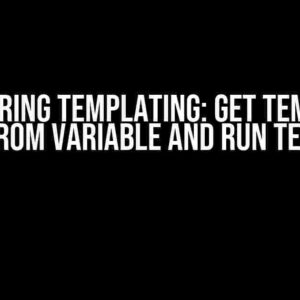Are you tired of struggling to extract the last value from a JSON object? Do you find yourself scratching your head, wondering why it’s so hard to get that one pesky value? Fear not, dear developer! In this article, we’ll take you on a thrilling adventure to uncover the secrets of JSON and show you exactly how to get the last value from an extracted variable.
What is JSON, Anyway?
Before we dive into the nitty-gritty, let’s take a step back and review what JSON (JavaScript Object Notation) is all about. JSON is a lightweight, human-readable data interchange format that’s widely used in web development. It’s a way to represent data in a structured, easy-to-parse format that’s perfect for exchanging data between web servers, web applications, and mobile apps.
JSON data is composed of key-value pairs, arrays, and objects. It’s often used to store data in NoSQL databases, pass data between web services, and even configure web applications.
The Problem: Getting the Last Value
Now, let’s say you’ve extracted a JSON object from a web service or database, and you need to get the last value from an array or object. Sounds simple, right? Wrong! Getting the last value can be a real challenge, especially if you’re new to JSON or JavaScript.
Take, for example, the following JSON object:
{
"colors": [
"red",
"green",
"blue",
"yellow"
],
"shapes": {
"circle": "round",
"square": "angular",
"triangle": "pointy"
}
}
How do you get the last value from the “colors” array or the “shapes” object?
Method 1: Using Array Methods
If you’re dealing with an array, you can use the `length` property to get the last value. Here’s an example:
const jsonData = {
"colors": [
"red",
"green",
"blue",
"yellow"
]
};
const lastColor = jsonData.colors[jsonData.colors.length - 1];
console.log(lastColor); // Output: "yellow"
This method works beautifully for arrays, but what about objects?
Method 2: Using Object Methods
For objects, you can use the `Object.keys()` method to get an array of keys, and then use the `length` property to get the last key. Here’s an example:
const jsonData = {
"shapes": {
"circle": "round",
"square": "angular",
"triangle": "pointy"
}
};
const shapeKeys = Object.keys(jsonData.shapes);
const lastShape = shapeKeys[shapeKeys.length - 1];
console.log(lastShape); // Output: "triangle"
But, what about getting the last value itself, not just the key?
Method 3: Using Object Entries
One way to get the last value from an object is to use the `Object.entries()` method, which returns an array of key-value pairs. You can then use the `pop()` method to get the last element of the array:
const jsonData = {
"shapes": {
"circle": "round",
"square": "angular",
"triangle": "pointy"
}
};
const shapeEntries = Object.entries(jsonData.shapes);
const lastShapeEntry = shapeEntries.pop();
console.log(lastShapeEntry[1]); // Output: "pointy"
This method works, but it’s a bit convoluted. Is there a simpler way?
Method 4: Using a Library
If you’re using a library like Lodash, you can use the `last()` function to get the last value from an array or object:
const _ = require('lodash');
const jsonData = {
"colors": [
"red",
"green",
"blue",
"yellow"
]
};
const lastColor = _.last(jsonData.colors);
console.log(lastColor); // Output: "yellow"
This method is elegant and simple, but it requires you to include an additional library in your project.
Method 5: Using a Custom Function
If you don’t want to use a library, you can create a custom function to get the last value from an object or array:
function getLastValue(obj) {
if (Array.isArray(obj)) {
return obj[obj.length - 1];
} else {
const keys = Object.keys(obj);
return obj[keys[keys.length - 1]];
}
}
const jsonData = {
"colors": [
"red",
"green",
"blue",
"yellow"
],
"shapes": {
"circle": "round",
"square": "angular",
"triangle": "pointy"
}
};
console.log(getLastValue(jsonData.colors)); // Output: "yellow"
console.log(getLastValue(jsonData.shapes)); // Output: "pointy"
This function works for both arrays and objects, and it’s a nice, reusable piece of code.
Conclusion
Getting the last value from a JSON extracted variable might seem daunting at first, but with these five methods, you’re equipped to tackle even the most stubborn JSON data. Whether you’re using array methods, object methods, object entries, a library, or a custom function, you can confidently extract the last value from your JSON data.
So, the next time you’re faced with a JSON puzzle, remember: with a little creativity and the right tools, you can unlock even the most elusive values.
| Method | Description |
|---|---|
| Array Methods | Use the `length` property to get the last value from an array. |
| Object Methods | Use the `Object.keys()` method to get an array of keys, and then use the `length` property to get the last key. |
| Object Entries | Use the `Object.entries()` method to get an array of key-value pairs, and then use the `pop()` method to get the last element. |
| Library | Use a library like Lodash to get the last value from an array or object using the `last()` function. |
| Custom Function | Create a custom function to get the last value from an object or array using a combination of array and object methods. |
Which method will you choose? The world of JSON is full of possibilities!
Frequently Asked Question
Stuck with extracting the last value from your JSON variable? Worry not, we’ve got you covered!
How do I get the last value from a JSON array?
You can use the `length` property of the JSON array to get the last index and then access the value at that index. For example: `const lastIndex = jsonArray.length – 1; const lastValue = jsonArray[lastIndex];`
What if my JSON variable is an object, not an array?
No worries! You can use the `Object.keys()` method to get an array of keys, and then access the last key-value pair. For example: `const lastKey = Object.keys(jsonObject)[Object.keys(jsonObject).length – 1]; const lastValue = jsonObject[lastKey];`
Can I use a more concise way to get the last value?
Yes, you can use destructuring to get the last value in one line. For example: `const LAST_VALUE = […jsonArray].pop();` or `const LAST_VALUE = { …jsonObject }[Object.keys({ …jsonObject })[Object.keys({ …jsonObject }).length – 1]];`
What if my JSON variable is nested, and I need to get the last value from a specific property?
You can use the `optional chaining operator` (`.?`) to access the nested property and then get the last value. For example: `const lastValue = jsonObject?.nestedProperty?.[jsonObject?.nestedProperty?.length – 1];`
How to handle cases where the JSON variable is empty or undefined?
You can use conditional statements or optional chaining to handle these cases. For example: `const lastValue = jsonArray?.[jsonArray?.length – 1] ?? ‘default value’;` or `if (jsonArray && jsonArray.length > 0) { const lastValue = jsonArray[jsonArray.length – 1]; } else { console.log(‘Array is empty or undefined’); }`


